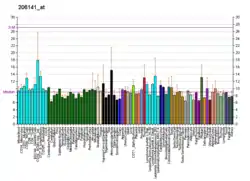MOCS3
Adenylyltransferase and sulfurtransferase MOCS3 is an enzyme that in humans is encoded by the MOCS3 gene.[4][5]
Molybdenum cofactor (MoCo) is necessary for the function of all molybdoenzymes. One of the enzymes required for the biosynthesis of MoCo is molybdopterin synthase (MPT synthase). The protein encoded by this gene adenylates and activates MPT synthase. This gene contains no introns. A pseudogene of this gene is present on chromosome 14.[5]
References
- GRCh38: Ensembl release 89: ENSG00000124217 - Ensembl, May 2017
- "Human PubMed Reference:". National Center for Biotechnology Information, U.S. National Library of Medicine.
- "Mouse PubMed Reference:". National Center for Biotechnology Information, U.S. National Library of Medicine.
- Matthies A, Nimtz M, Leimkuhler S (May 2005). "Molybdenum cofactor biosynthesis in humans: identification of a persulfide group in the rhodanese-like domain of MOCS3 by mass spectrometry". Biochemistry. 44 (21): 7912–20. doi:10.1021/bi0503448. PMID 15910006.
- "Entrez Gene: MOCS3 molybdenum cofactor synthesis 3".
Further reading
- Reiss J, Johnson JL (2003). "Mutations in the molybdenum cofactor biosynthetic genes MOCS1, MOCS2, and GEPH". Hum. Mutat. 21 (6): 569–76. doi:10.1002/humu.10223. PMID 12754701. S2CID 41013043.
- Johnson JL, Coyne KE, Rajagopalan KV, et al. (2002). "Molybdopterin synthase mutations in a mild case of molybdenum cofactor deficiency". Am. J. Med. Genet. 104 (2): 169–73. doi:10.1002/1096-8628(20011122)104:2<169::AID-AJMG1603>3.0.CO;2-8. PMID 11746050.
- Deloukas P, Matthews LH, Ashurst J, et al. (2002). "The DNA sequence and comparative analysis of human chromosome 20". Nature. 414 (6866): 865–71. doi:10.1038/414865a. PMID 11780052.
- Cortese MS, Caplan AB, Crawford RL (2003). "Structural, functional, and evolutionary analysis of moeZ, a gene encoding an enzyme required for the synthesis of the Pseudomonas metabolite, pyridine-2,6-bis(thiocarboxylic acid)". BMC Evol. Biol. 2: 8. doi:10.1186/1471-2148-2-8. PMC 115864. PMID 11972321.
- Strausberg RL, Feingold EA, Grouse LH, et al. (2003). "Generation and initial analysis of more than 15,000 full-length human and mouse cDNA sequences". Proc. Natl. Acad. Sci. U.S.A. 99 (26): 16899–903. doi:10.1073/pnas.242603899. PMC 139241. PMID 12477932.
- Matthies A, Rajagopalan KV, Mendel RR, Leimkühler S (2004). "Evidence for the physiological role of a rhodanese-like protein for the biosynthesis of the molybdenum cofactor in humans". Proc. Natl. Acad. Sci. U.S.A. 101 (16): 5946–51. doi:10.1073/pnas.0308191101. PMC 395903. PMID 15073332.
- Lehner B, Sanderson CM (2004). "A protein interaction framework for human mRNA degradation". Genome Res. 14 (7): 1315–23. doi:10.1101/gr.2122004. PMC 442147. PMID 15231747.
- Gerhard DS, Wagner L, Feingold EA, et al. (2004). "The status, quality, and expansion of the NIH full-length cDNA project: the Mammalian Gene Collection (MGC)". Genome Res. 14 (10B): 2121–7. doi:10.1101/gr.2596504. PMC 528928. PMID 15489334.
- Rual JF, Venkatesan K, Hao T, et al. (2005). "Towards a proteome-scale map of the human protein-protein interaction network". Nature. 437 (7062): 1173–8. doi:10.1038/nature04209. PMID 16189514. S2CID 4427026.
- Krepinsky K, Leimkühler S (2007). "Site-directed mutagenesis of the active site loop of the rhodanese-like domain of the human molybdopterin synthase sulfurase MOCS3. Major differences in substrate specificity between eukaryotic and bacterial homologs". FEBS J. 274 (11): 2778–87. doi:10.1111/j.1742-4658.2007.05811.x. PMID 17459099. S2CID 82541137.
This article is issued from Wikipedia. The text is licensed under Creative Commons - Attribution - Sharealike. Additional terms may apply for the media files.


